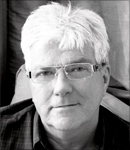 I happen to think that I’m one of the luckiest men that I know. I have an awesome family, great friends, decent health, and an amazing career. The reason I bring this up is because they have all taught me and helped me to love and respect this planet and everything that calls it home.
I happen to think that I’m one of the luckiest men that I know. I have an awesome family, great friends, decent health, and an amazing career. The reason I bring this up is because they have all taught me and helped me to love and respect this planet and everything that calls it home.
Many years ago I remember watching my mum carefully removing the labels from cans, opening both ends and squashing the cans with the lids stuffed inside. That seemed to be the extent of conscious recycling in those days. Once a week, my mum and dad would drive to the recycling depot with a large box full of gleaming cans of all sizes to be deposited in a large bin. Good on them!
I recall that I learned to appreciate our land at a young age. Every summer vacation was a family camping trip in either Ontario or Quebec. Before we set up our tent, dad would have us kids make a rake out of twigs and branches and then sweep the entire camp site and pick up any garbage that was left behind. We went on every nature walk that was going being one with the natural habitat. When we struck camp, we swept again. I never knew my dad to be anything but dedicated to being a custodian of the earth.
The biggest influence on my love for this land came from my brother Rob. He taught me not to litter, even a gum wrapper. He used to keep the empty wrapper in his pocket so he had a place to put the spent piece of chew so it could be disposed of properly at a later date. No junk from fast food joints was ever to leave the car unless it was to get rid of it properly.
He taught me auto mechanics. He‘s truly a natural gear head and I still kid him about having wheels, gears, pullies and fan belts in his head fighting with the little grey cells. We would do our own maintenance on the family cars and he insisted we dispose of all scrap oil and rags at a certified depot. This included sweeping and keeping the garage floor pristine. He taught me how to wash the car using as little fresh water as possible. I helped him tear-down and rebuild from the ground up including the engine and gearbox of his 1954 VW Beetle. This didn’t teach me about conservation per se but it further cemented the bond and admiration I held for him and only made me want to be more like him. To this day, he maintains the same principles.
Dad was never far from my psyche. He, Rob, and I loved car racing and there were many weekends spent at the major race track northeast of the city to watch the amazing Can Am Group 7 Sports Racing machines like McLarens, Chaparrals, Lolas, Porsches, and others. At the time they were the fastest cars on any track anywhere in North America. Even in the early sixties, these high-end racing teams were aware of emissions. In an interview at the time, the late Bruce McLaren said, “There are two very important areas where cleanliness is a must. The first is the fuel injection system. You’ve got to have clean fuel – that’s all there is to it. The oil system’s even more critical. The entire system inside and out demands strict cleanliness.”
We slept in the car and dad insisted we take our own firewood, mostly offcuts and scrap lumber from one home reno job or another rather than take anything from nature. The three of us were so tall we had to sleep with our feet hanging out the open doors of the car.
As much as I loved the races and the rallying, I never saw any correlation between fuel-ravenous cars and the good of the planet. Was I wrong or was it simply not talked or thought about? I continued to be oblivious.
After graduating high school, I spent time at the Ontario College of Art working towards a degree in English, Art History, Two and Three-D Design, Museum Studies and Drafting. One weekend, hundreds of OCA students gathered along the banks of the Don River that flows through the east end of Toronto. We were there as part of a burial session for the overly polluted river by offering up flowers and chanting goodbye. I’m glad to say that today, after years of concerted clean-up the Don now boasts a thriving ecosystem.
Then I grew older, married an awesome lady and had a boy and a girl. I started my journey to teach them the stuff I had learned and the things I was so passionate about. We still love camping and I took every opportunity to teach my little ones about how important this earth is to them. How precious life all around them is.
We had a fantastic family dog – an Airedale. He was like a built-in baby sitter. Nobody got near our kids when Dougal was on the job. He never balked at the opportunity to go for a family walk and never failed to be the family protector. I know he taught the kids and me to think about nature and what was real in the world around us. They put all of their faith in his being there at all times. Today, each of my grandchildren enjoy the fun and beauty of having their own family pets. My grandson has and studies his ball python, king snake, waxy monkey tree frog, rescued alley cat, frilled lizard and the most beautiful and charismatic Boston terrier I’ve ever met. My granddaughters in the Maritimes enjoy their Chesapeake Bay retriever and a fluffy pussy cat. My son-in-law is one of a handful of people registered with the Canadian Government as a trapper/conservationist. Not long ago he was sent to the west coast to cull over 700 ducks that were invading and threatening the very being of a resident population of ducks. Killing sounds cruel I know but it was for the good of the entire flock and to ensure their future.
I landed one of the most incredible jobs I could ever hope for. I became a photojournalist/brochure designer for an aircraft manufacturer here in Toronto. I was sent half-way around the world and then some in search of story material and photos of the company’s fantastic lineup of STOL (Short Take Off and Landing) airplanes. All of the trips were fantastic but one has stayed in my mind over the rest. I spent twelve days in Greenland where the population rely on the various helicopters and fixed-wing aircraft of Air Greenland. When I was there the name of the airline was Greenlandair. I had the advantage of being in the jump seat between the two pilots on every flight so the photos I got were awesome. Many of the villages were accessible only by helicopter which was the beating heart of the village and surrounding area.
Most people lived the way their ancestors had for millennia – mostly fishing and whale and seal hunting. One of the highlights of a trip took us along the coast of a fjord and the pilots dropped the helicopter to mere metres off the water. All of a sudden several bowhead whales came to the surface and started swimming in step with the chopper. Apparently they hear the chop of the rotors and turn the flight into a game of ‘catch me if you can.’ This, as you can imagine, was a delight to the passengers.
After the leviathans peeled off we continued along the coast and I witnessed the most primeval sight I have ever seen. Several Inuit hunters were in their tiny boats and had surrounded a bowhead whale. The native peoples were hurling harpoons into the hapless victim. The water was red as the hunters overcame their prey. Seeing this made me at once sad and thankful that I could witness people who live off the land were securing their future as short as it may be but taking a majestic creature from the sea in order to do so. With these thoughts in my mind and as my travels through this magnificent land continued, I felt a real bond with the people and only hoped their futures were secure. What I found interesting after being told by the pilots was the gulf that exists between those who have and those who have not. Hundreds of miles north of where we saw the whale slaughter, companies were capturing glacial meltwater to drive huge generators to supply the north western region of Greenland with electrical power. What a contrast – hunting game with archaic tools to implementing hi-tech equipment and methods to provide electric power in a northern area of the country. Where is the middle ground? I want to think that I’m aware of the difference but continue to look around me and see what I’ve learned with regard to saving this planet and where the bottom of the equation lies.
My hope is that I and all of my family and friends will continue to follow their roots and keep the same regard that I have learned for the environment and show the same drive to ensure our planet and, by extension, our lives, will have an awesome future.
Today, as editor-in-chief of Electric Energy T&D magazine, I have the pure luxury of spending my time associating with some of the greatest minds in the electrical industry including renewable energy on line and at conferences and expositions. The sheer magnitude of intelligence amongst these industry players boggles my mind and from these people I draw strength to continue my conservation efforts through the efforts made by everyone in the industry.
I also produce a weekly online column called Global Renewable News. This gives me a chance to learn more and more about where we are going and how we are getting there with regards to saving our planet. I don’t think it could get any better. The efforts that are trailblazing the pathways with alternate fuel sources and renewable energies are truly worthy and encouraging. I don’t think it could get any better – nourishing my need to save and protect – and actually getting paid to do so.







